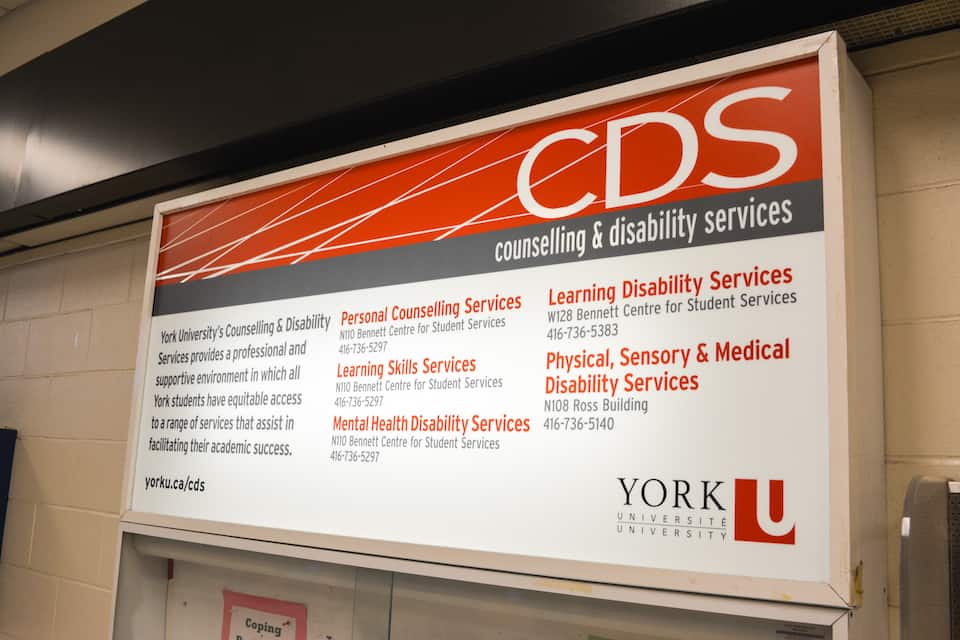[dropcap]A[/dropcap]ccording to The Journal of Postsecondary Education and Disability, there has been a 67 per cent increase in the number of post-secondary students registered with a mental health disability between 2006 and 2011.
Recently, York University student Navi Dhanota won a two-year human rights complaint against York University. The policy in question required a student to declare their mental health disability in order to register for academic support.
Possibly blinded by Dhanota’s own best intentions, Ontario Human Rights Commissioner Renu Mandhane is describing the recent abolition of this policy as “a win for students.” On a broader scale, however, this change in policy has the potential to do more harm than good.
The revision of the academic accommodation policy that Dhanota, ARCH Disability Law Centre, and York University settled on undoubtedly coincides with the Ontario Human Rights Code. It upholds a student’s right to personal privacy and can be seen as a way to prevent discrimination based on mental health.
When it comes to mental health, however, clinging onto every ounce of privacy may not be the best solution for providing students with accommodations. Marc Wilchesky, executive director of Counselling and Disability Services at York University, has already expressed concern over the complications this change in policy could create. In an interview with the Toronto Star, he stated, “…[I]t may make it a little more difficult to come up with the appropriate accommodation.”
Previously, like many other Canadian universities, York relied on the defining terms outlined in the Diagnostic and Statistical Manual of Mental Disorders to register a student for academic support. These diagnoses are not merely labels meant to generically categorize individuals; instead, they act as a starting point for professionals to determine a student’s personal needs.
Without them, specialists like Wilchesky are left to work backwards, most likely retracing steps that have already been taken and rehashing paths that have already been discarded. Ultimately, these definitions act as a foundational base that can accelerate the provision and efficiency of accessibility services.
Aside from providing necessary information, detailed registration packages are also the first step in eliminating potential abuse of an accessibility services system. Basically, York has created a more lenient policy for a department that can easily be targeted for misuse. Also, York now provides interim accommodation, which allows students who are pending assessment to access this service as well. The conjunction of these two factors can result in the misuse of this new policy, which would hinder the students that it was meant to protect in the first place.
Confident that the Ontario Human Rights Commission “has enough power and influence,” Mandhane is now urging other postsecondary institutions to follow suit and “bring their policies in line.” Hopefully, U of T’s Accessibility Services will fully consider the implications of such a change in policy before rushing to any conclusions.
Instead of rewriting policies, it would be more beneficial for accessibility services departments to focus on creating environments where the ability to not disclose diagnoses is simply unnecessary. While this new privacy policy is perhaps helpful for students to cope in the meantime, it is necessary to keep in mind the more important longer term goal of socio-cultural change: that is, ensuring that our academic environments inspire enough comfort, safety, and open conversation to disclose diagnoses in the first place, not force students like Dhanota to respond with human rights complaints.
York’s new policy is taking a step backwards in breaking down the social stigma surrounding mental health, in that it allows students to withhold the truth at a time when it should be expressed freely, when it can only be used advantageously. Mandhane wholeheartedly believes that this is “just one more step to destigmatizing,” but that is far from the truth; sadly, all she has managed to do is legally shove the elephant back in the room.
Ariel Gomes is The Varsity‘s Associate Senior Copy Editor.


